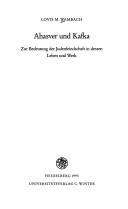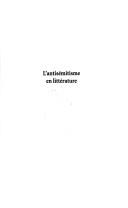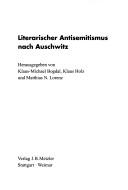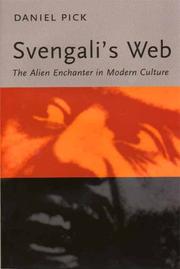| Listing 1 - 10 of 70 | << page >> |
Sort by
|
Book
ISBN: 9780472130344 Year: 2017 Publisher: Ann Arbor : University of Michigan Press,
Abstract | Keywords | Export | Availability | Bookmark
 Loading...
Loading...Choose an application
- Reference Manager
- EndNote
- RefWorks (Direct export to RefWorks)
"Of all the Canterbury Tales, Geoffrey Chaucer's Prioress's Tale, in which a young schoolboy is murdered by Jews for singing a song in praise of the Virgin Mary, poses a problem to contemporary readers because of the anti-semitism of the story it tells. Both the Tale's anti-semitism and its "Chaucerianism"-- its fitness or aptness as part of the Chaucerian canon--are significant topics of reflection for modern readers, who worry about the Tale's ethical implications as well as Chaucer's own implications. Over the past fifty years, scholars have asked whether the anti-semitism in the tale is that of the Prioress? Or of Chaucer the pilgrim? Or of Chaucer the author? Or, indeed, whether one ought to discuss anti-semitism in the Prioress's Tale at all, considering the potential anachronism of expecting medieval texts to conform to contemporary ideologies. The Critics and the Prioress responds to a critical stalemate between the demands of ethics and the entailments of methodology. The book addresses key moments in criticism of the Prioress's Tale--particularly those which stage an encounter between historicism and ethics--in order to interrogate these critical impasses while suggesting new modes for future encounters. It is an effort to identify, engage, and reframe some significant--and perennially repeated--arguments staked out in this criticism, such as the roles of gender, aesthetics, source studies, and the appropriate relationship between ethics and historicism. The Critics and the Prioress will be an essential resource for Chaucer scholars researching as well as teaching the Prioress's Tale. Scholars and students of Middle English literature and medieval culture more generally will also be interested in this book's rigorous analysis of contemporary scholarly approaches to expressions of anti-semitism in Chaucer's England"--
Book
ISBN: 0472122819 Year: 2017 Publisher: Ann Arbor : University of Michigan Press,
Abstract | Keywords | Export | Availability | Bookmark
 Loading...
Loading...Choose an application
- Reference Manager
- EndNote
- RefWorks (Direct export to RefWorks)
"Of all the Canterbury Tales, Geoffrey Chaucer's Prioress's Tale, in which a young schoolboy is murdered by Jews for singing a song in praise of the Virgin Mary, poses a problem to contemporary readers because of the anti-semitism of the story it tells. Both the Tale's anti-semitism and its "Chaucerianism"-- its fitness or aptness as part of the Chaucerian canon--are significant topics of reflection for modern readers, who worry about the Tale's ethical implications as well as Chaucer's own implications. Over the past fifty years, scholars have asked whether the anti-semitism in the tale is that of the Prioress? Or of Chaucer the pilgrim? Or of Chaucer the author? Or, indeed, whether one ought to discuss anti-semitism in the Prioress's Tale at all, considering the potential anachronism of expecting medieval texts to conform to contemporary ideologies. The Critics and the Prioress responds to a critical stalemate between the demands of ethics and the entailments of methodology. The book addresses key moments in criticism of the Prioress's Tale--particularly those which stage an encounter between historicism and ethics--in order to interrogate these critical impasses while suggesting new modes for future encounters. It is an effort to identify, engage, and reframe some significant--and perennially repeated--arguments staked out in this criticism, such as the roles of gender, aesthetics, source studies, and the appropriate relationship between ethics and historicism. The Critics and the Prioress will be an essential resource for Chaucer scholars researching as well as teaching the Prioress's Tale. Scholars and students of Middle English literature and medieval culture more generally will also be interested in this book's rigorous analysis of contemporary scholarly approaches to expressions of anti-semitism in Chaucer's England"--

ISBN: 3825300927 9783825300920 Year: 1993 Volume: 125 Publisher: Heidelberg : Winter,
Abstract | Keywords | Export | Availability | Bookmark
 Loading...
Loading...Choose an application
- Reference Manager
- EndNote
- RefWorks (Direct export to RefWorks)
Book
ISBN: 3261044616 Year: 1991 Publisher: Bern : Lang,
Abstract | Keywords | Export | Availability | Bookmark
 Loading...
Loading...Choose an application
- Reference Manager
- EndNote
- RefWorks (Direct export to RefWorks)

ISBN: 9782828908546 2828908542 Year: 2006 Publisher: Lausanne: Favre,
Abstract | Keywords | Export | Availability | Bookmark
 Loading...
Loading...Choose an application
- Reference Manager
- EndNote
- RefWorks (Direct export to RefWorks)
Catalogue de propos considérés de près ou de loin antisémites, véhiculés par des auteurs aussi divers que : saint Augustin, Saint Louis, Bossuet, Mahomet, l'ayatollah Khomeiny, l'Abbé Pierre, Ivan le Terrible, Charles Maurras, Charles de Gaulle, Emmanuel Kant, Charles Fourier, Karl Marx, William Shakespeare, Adolf Hitler... Les références des propos cités ne sont pas toujours mentionnées.
Antisemitism in literature --- French literature --- Antisemitism

ISBN: 9783476022400 Year: 2007 Publisher: Stuttgart Metzler
Abstract | Keywords | Export | Availability | Bookmark
 Loading...
Loading...Choose an application
- Reference Manager
- EndNote
- RefWorks (Direct export to RefWorks)
Antisemitism in literature --- Antisemitism --- German literature --- History --- History and criticism
Book
ISBN: 347602119X 9783476021199 3476001636 Year: 2005 Publisher: Stuttgart Metzler
Abstract | Keywords | Export | Availability | Bookmark
 Loading...
Loading...Choose an application
- Reference Manager
- EndNote
- RefWorks (Direct export to RefWorks)
Walser, Martin, --- Antisemitism in literature. --- Jews in literature.
Book
Year: 1920 Publisher: Paris : G. Crès,
Abstract | Keywords | Export | Availability | Bookmark
 Loading...
Loading...Choose an application
- Reference Manager
- EndNote
- RefWorks (Direct export to RefWorks)
Book
Year: 1920 Publisher: Paris : G. Crès,
Abstract | Keywords | Export | Availability | Bookmark
 Loading...
Loading...Choose an application
- Reference Manager
- EndNote
- RefWorks (Direct export to RefWorks)

ISBN: 0300082045 9780300082043 Year: 2000 Publisher: New Haven: Yale university press,
Abstract | Keywords | Export | Availability | Bookmark
 Loading...
Loading...Choose an application
- Reference Manager
- EndNote
- RefWorks (Direct export to RefWorks)
Antisemitism in literature. --- Arts, Modern --- Hypnotism --- Mesmerism in literature. --- Mesmerism. --- Psychological aspects. --- History. --- Mesmerism in literature --- Mesmerism --- Antisemitism in literature
| Listing 1 - 10 of 70 | << page >> |
Sort by
|

 Search
Search Feedback
Feedback About UniCat
About UniCat  Help
Help News
News